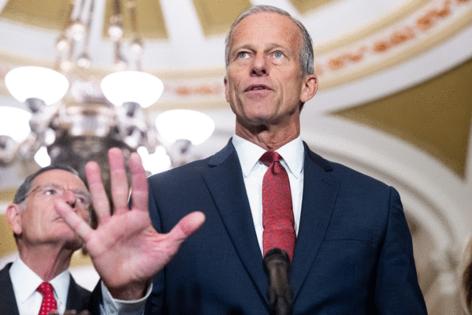Bill Dudley: America, this isn't how you lower interest rates
Published in Op Eds
America’s leaders have latched onto the idea that they can address some big problems — most notably a gaping budget deficit — by forcing interest rates downward.
If only it were that easy.
President Donald Trump keeps turning up the pressure on the Federal Reserve to lower short-term rates, publicly expressing his dissatisfaction with Chair Jerome Powell. Treasury Secretary Scott Bessent wants to reduce longer-term rates by issuing less long-term U.S. debt. Financial regulators are tweaking capital requirements, encouraging the largest U.S. banks to buy and hold more Treasury securities, which would push prices up and yields down.
If these efforts worked as intended, they could deliver significant benefits. If interest rates were a mere percentage point lower than the Congressional Budget Office’s current projections, the government could save about $3.5 trillion in debt-service costs over 10 years — not far from what the One Big Beautiful Bill Act that just passed Congress is expected to add to the federal budget deficit over the same period.
Unfortunately, the administration’s efforts aren’t likely to succeed — and could even have the opposite of the desired effect.
Consider the Fed. Trump’s attacks, along with his stated aim of installing a chair who favors lower rates, threaten to increase expectations of future inflation and hence drive up longer-term bond yields. Any inkling that the Fed might cave to the president’s demands would only make things worse. Hence, to offset the Trump factor and maintain the market’s confidence, the Fed will likely have to err on the side of caution, holding short-term rates higher than it otherwise would.
Bessent’s plan for Treasury issuance might have some effect. If the same number of investors are bidding for a smaller supply of longer-term Treasuries, yields should fall. But the move will be marginal at best, measured in basis points, not percentage points. Long-term yields depend far more on the anticipated path of short-term rates than on the composition of Treasury issuance. Also, by departing from a decades-long policy of “regular and predictable” issuance, the Treasury’s gambit might generate uncertainty that would undercut any benefit.
Worse, the Treasury must still borrow enough to finance the vast budget deficit. So it’ll have to issue more short-term debt, making the government’s finances more sensitive to future shifts in short-term rates. At the extreme, if all Treasury debt were short-term, the government’s debt-service costs would soar every time the Fed raised rates. This could lead to fiscal dominance, in which the government’s fiscal predicament would severely impair the Fed’s ability to manage the economy.
Easing capital requirements isn’t much better. At issue is the supplementary leverage ratio, which limits banks’ capacity to hold Treasury securities because it treats all assets equally, regardless of risk. It’s designed as a backstop, to ensure banks have enough loss-absorbing equity to survive an economic downturn or financial crisis. Loosening it won’t be sufficient to drive a big decline in longer-term yields. Banks’ appetite for such Treasuries will be limited, because they don’t want too much exposure to interest-rate risk.
If administration officials really want to get interest rates down, they have superior options — including discarding policies that push in the wrong direction.
First, get government finances under control. The Big Beautiful Bill is a fiscal disaster: It’s likely to add more than $3 trillion to the federal deficit over the next decade, entailing greater Treasury debt issuance and ever-higher debt service costs. Some evidence of prudence — for example, reforming Social Security to put it on a more sustainable trajectory — would reassure investors.
Second, provide greater clarity and certainty about trade policy. Trump’s tariff wars have reduced foreign investors’ appetite for Treasury debt. Witness how the dollar has fallen sharply, even though higher tariffs should lead to a stronger currency.
Third, stop threatening the Fed’s independence. A penchant for lower interest rates shouldn’t be the primary qualification for the next Fed chair.
Fourth, abandon any consideration of a “Mar-a-Lago Accord,” which would force foreign governments to swap their Treasury debt holdings into long-dated, low-yielding obligations.
Fifth, make the Treasury market more resilient. Making more trading centrally cleared, for example, would make it less susceptible to dysfunction such as the March 2020 “dash for cash.” Opening the Fed’s financing facility to all Treasury holders, not just banks and primary dealers, would encourage a greater variety of investors to hold more securities. So would expanding the Treasury’s debt buyback program, designed to increase liquidity in off-the-run securities.
The Trump administration is unlikely to follow the most important parts of this advice. But the math is undeniable: On the present course, a decade from now, deficit-driven debt-service costs, Social Security and Medicare will each be one percentage point of GDP larger, according to the Congressional Budget Office. Merely trying to bully interest rates down won’t be a meaningful part of the solution.
_____
This column reflects the personal views of the author and does not necessarily reflect the opinion of the editorial board or Bloomberg LP and its owners.
Bill Dudley is a Bloomberg Opinion columnist. A former president of the Federal Reserve Bank of New York, he is a nonexecutive director at Swiss Bank UBS and a member of Coinbase Global's advisory council.
_____
©2025 Bloomberg L.P. Visit bloomberg.com/opinion. Distributed by Tribune Content Agency, LLC.

























































Comments